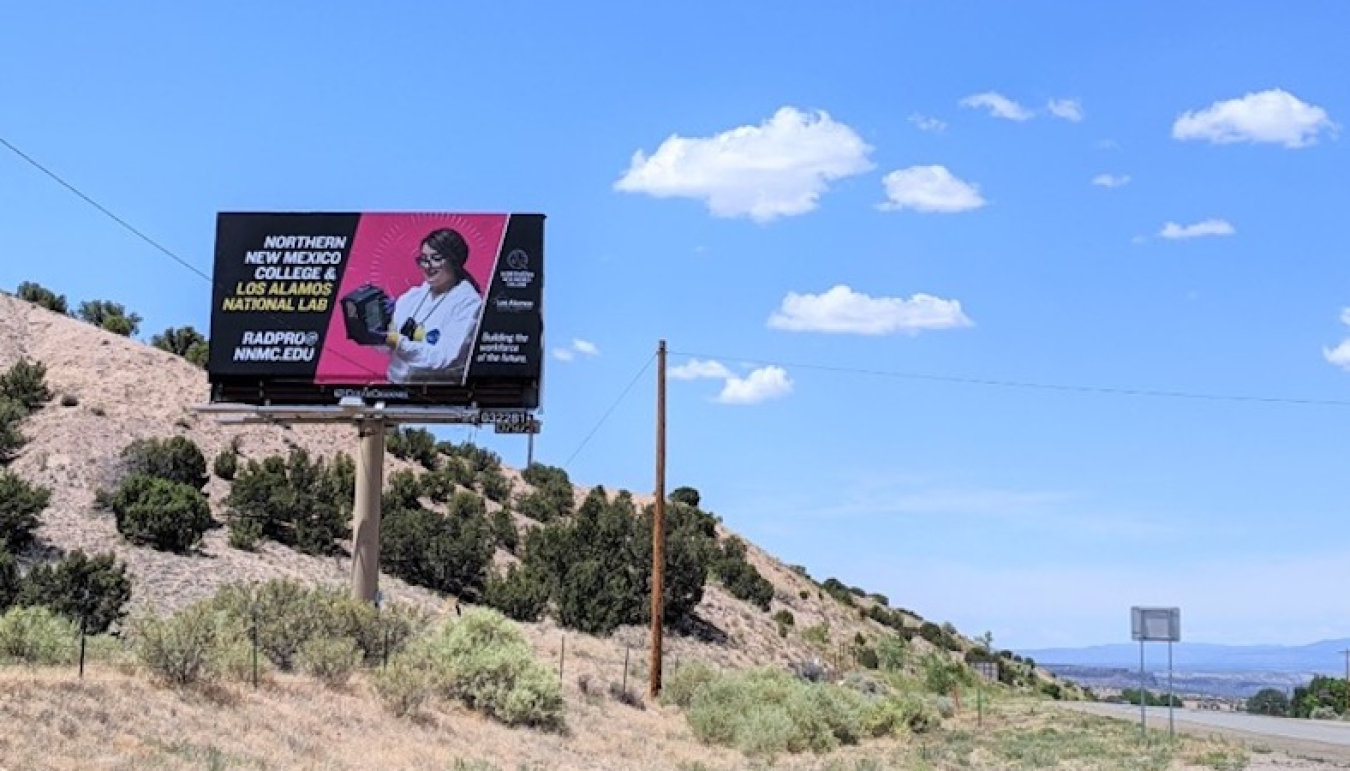A program with Northern New Mexico College and Los Alamos National Laboratory funds a faculty member, career services, materials, and internships.
August 21, 2020
Editor's note: this article was originally published at Los Alamos National Laboratory's website.
The first graduates of a newly-revised program at Northern New Mexico College (NNMC) in Española have recently started their careers in radiation protection at the Laboratory. NNMC has long provided courses in radiation protection, but a partnership signed last year with the Lab expanded the offerings of the associate degree program.
Under the five-year agreement, the Laboratory provides funding that supports a full-time faculty member at the college, a career services position, materials and equipment, and ten paid internships per year. The internships not only provide for students’ tuition, fees, books and class time, but provide a pathway to a job at the Lab after graduation.
A Vital Role
Radiological Control Technicians (RCTs) play a vital role in all Laboratory activities above a certain hazard level, where they must be present to actively monitor contamination levels, verify dose rates for areas and people, ensure compliance with federal and Laboratory policies and procedures, and complete the associated documentation. Much of the work that must occur to support the national security mission cannot take place without qualified RCTs present. As the work increases, so must the number of RCTs.
“The significance of the program is that it prepares local students to succeed at the Laboratory, and offers high-paying jobs in the community,” says Laboratory health physicist Mike Duran, who teaches classes alongside the new full-time NNMC faculty member Scott Braley. “All of this is important in providing knowledgeable students that are able to help support the work of the Laboratory.”
Quality education leads to lasting careers
With all the hiring the Laboratory does, finding qualified employees may not seem like such a challenge. However, the extremely specific training of an RCT is hard to come by in traditional education settings, so many of the employees hired as RCTs at the Lab previously were not academically prepared for the specifics of the role, and the Laboratory saw poor retention rates.
“Now, employees who come on as RCTs [from NNMC] have already invested two years of their life in preparing for the work and are significantly more likely to understand the job and be committed to it,” says Steve Costigan, group leader for Radiation Protection Programs at the Laboratory.
Investing together in future jobs
“The main thing that led me to the RCT program was definitely the job opportunity at LANL,” says Nathan Archuleta, an intern in the radiation protection program. “I was studying to be a medical radiation technician/sonographer, but plans changed and this program seemed like a good fit.”
A select few students from the program (including this year, Archuleta) become interns at LANL while they’re still in the NNMC degree program. The paid internship is competitive and supports students financially and guarantees a job contract after graduation. It also allows them to begin the security clearance process early. During the internship, students get on-site experience working as an RCT.
Erica Salazar recently started at the Lab as a full-time RCT after graduating from NNMC. She says that the radiation protection degree program captured her interest because it seemed both unique and challenging.
“As a student, I would go to different areas in the Lab and shadow an RCT to get used to some of the instruments,” Salazar says. “In my particular area, we would scan and survey a building that was going to be torn down to make sure there was no contamination. It’s definitely a different and interesting career choice.”
Ensuring safety for coworkers and families
Samuel Martinez got his first associate degree in 2008 in Pre-Business Administration at UNM-Los Alamos. In the past 10 years, he worked as a contractor on various environmental projects for the Lab. He heard about the RCT program at NNMC from his cousin, and felt it would be a good new career fit for him. He’s now in the internship program and on track to graduate this year. Many students in the degree program are non-traditional, later-career students like Martinez.
“The program is challenging but rewarding, and has knowledgeable and helpful professors. If someone is curious about how radiation works, it’s a good way to learn the science behind it,” Martinez says. “As an RCT, I want to help other employees remain safe throughout their workday at LANL, to ensure that they’re working in a hazard-free environment and that they go home safe to their families.”
Planning for the future
Last summer, more than 40 students had enrolled in courses in the degree program, and ten students were awarded the competitive internship at the Lab. The Laboratory expects to hire up to ten graduates of the NNMC program per year as both the program at the college and the opportunities at the Lab grow. This fall, the college will operate under COVID-19 restrictions, moving forward with virtual classes and some hands-on opportunities as precautions allow.
A vehicle for lasting careers
Joaquin Gallegos, Chair of NNMC’s Biology, Chemistry, and Environmental Science department, notes that while many education programs don’t necessarily provide a clear, viable job path, it’s the path directly to a job that makes this program stand out.
“We’re really excited about the partnership,” says Gallegos. “We want to keep our local demographic employed by providing that vehicle to a successful career.”
Kathy Keith
Ms. Keith is the Director, Community Partnerships Office, at Los Alamos National Laboratory.

